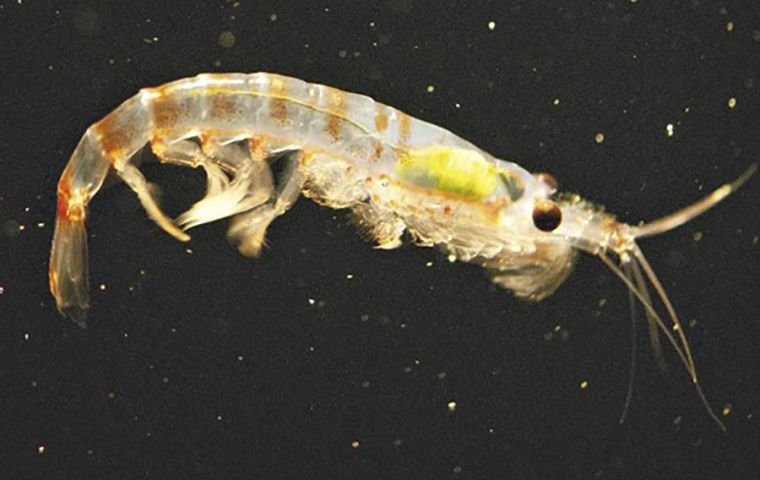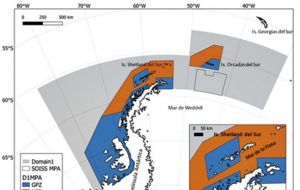MercoPress. South Atlantic News Agency
Argentina and Chile lobby for a Marine Protected Area west of Antarctica Peninsula
 It is estimated 75% of all Antarctic krill is to be found in the Peninsula region
It is estimated 75% of all Antarctic krill is to be found in the Peninsula region Argentine and Chilean relations have not been traditionally smooth given the several borderline disputes both in land and in the sea, but there is a chance that this rivalry turns into a biodiversity milestone, with the joint proposal to create a Marine Protected Area in waters next to west Antarctica Peninsula and south of the Scotia arc, a project in which the Chilean Antarctic Institute and Argentina's Antarctic Institute have been working on since 2012.
In 2017 the project was preliminarily presented before CCAMLR. Commission for the Conservation of Antarctica Marine Living Resources, which since 2002 is trying to develop a system of MPA's in Antarctica with the purpose of conserving biodiversity and the rational and responsible exploitation of resources in the area.
This is critical since many scientific research papers indicate that the Antarctic Peninsula is experiencing an increase in environment variability because of global climate warming. This has resulted in a thinning of the continent's cap, calving icebergs and instability.
The proposal was allegedly admitted, meaning the technical description of the proposal but the tallest wall is the political consensus in CCAMLR. In the framework of the Oceans Conference recently held in Lisbon, the two heads of the Antarctic Institutes, Juan Cabandié from Argentina and Maisa Rojas Corradi, from Chile met to assess the MPA in Antarctica was, and establish a road map.
The Antarctica MPA covers a total area of 670,000 sq kilometers in two zones, General Protection (blue in the map), with no fishing allowed particularly for krill and the Fishery zone (orange in the map) where krill can be netted, according to country quotas.
According to the Argentine Inter-governmental Group of Experts on Climate Change, global warming makes the polar ice cap far more unstable, which could have catastrophic consequences for coastal zones of the planet at sea level and impact of the global water mass. Likewise with cruise tourism and thinner ice, vessels approach deeper interfering with krill, and the food chain. And krill is crucial in carbon absorption and in the biodiversity current which circumvents the pole. Besides 75% of all Antarctic krill is to be found in the Peninsula region.
“The interesting factor is that to the Argentine and Chilean MPA initiative, which is in itself a milestone, must be added to the other two Antarctica MPAs, supported by Europe. in Eastern Antarctica and the Weddell Sea. Together the three cover an area equivalent to continental Europe,” according to members from the Argentine foreign ministry Technical desk.
However since CCAMLR decisions have to be unanimous, the initiative remains blocked by China and Russia. China because of its huge fishing fleet and the need to feed its people, while Russia's attitude responds to the current conflict with the West over the Ukraine invasion.
Argentina is also advancing in the creation of a benthonic MPA. Apparently a high productivity area on the continental shelf, and one of five priority areas chosen for the Blue Pampa project.
The new MPA has some 148,000 sq kilometers and is geared to protect marine assets, conservation of fishery resources and even a standing homage to the crew of the sunken submarine ARA San Juan, in the area.
The new MPA was approved last month in the Argentine Lower House and now faces the Senate vote. “It is an area rich in phytoplankton production, the first link of the food chain, and neighboring Argentine EEZ borderline, which registers an intense foreign fleets fishing activities”.





Top Comments
Disclaimer & comment rulesCommenting for this story is now closed.
If you have a Facebook account, become a fan and comment on our Facebook Page!